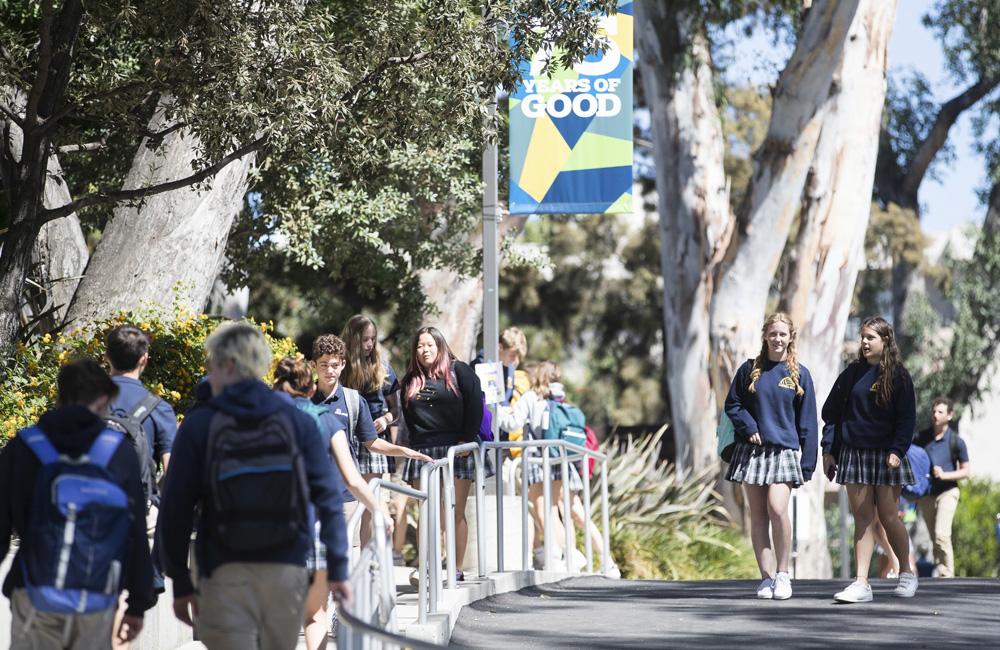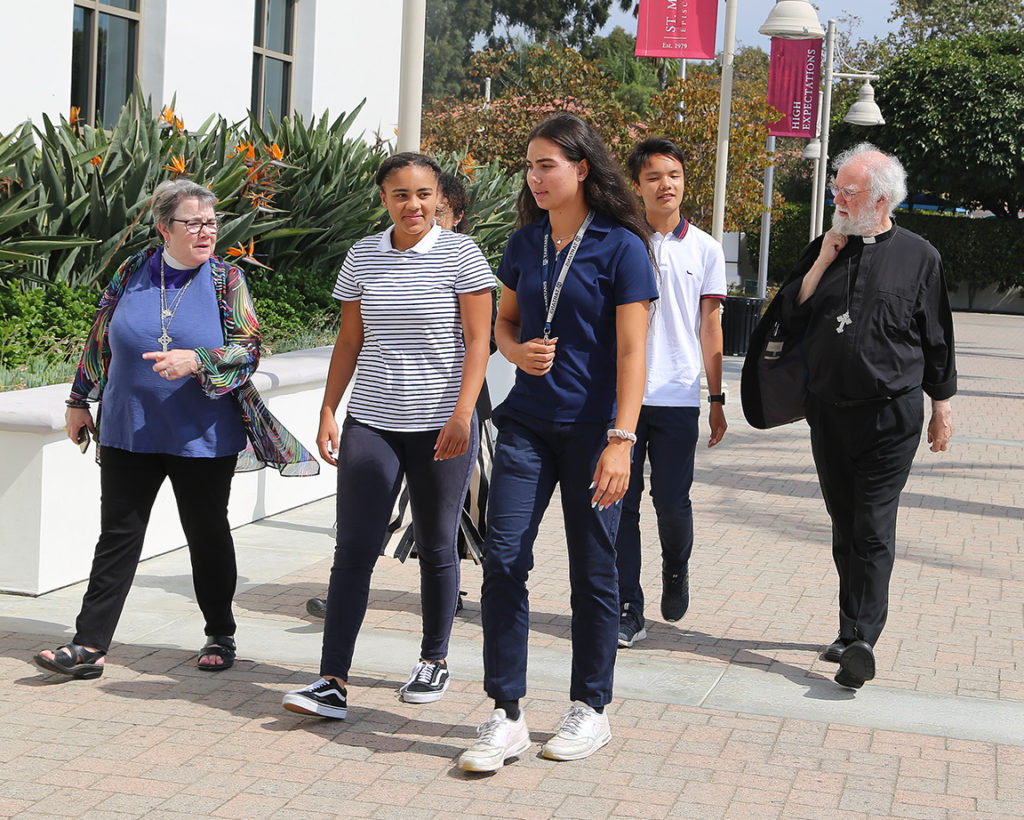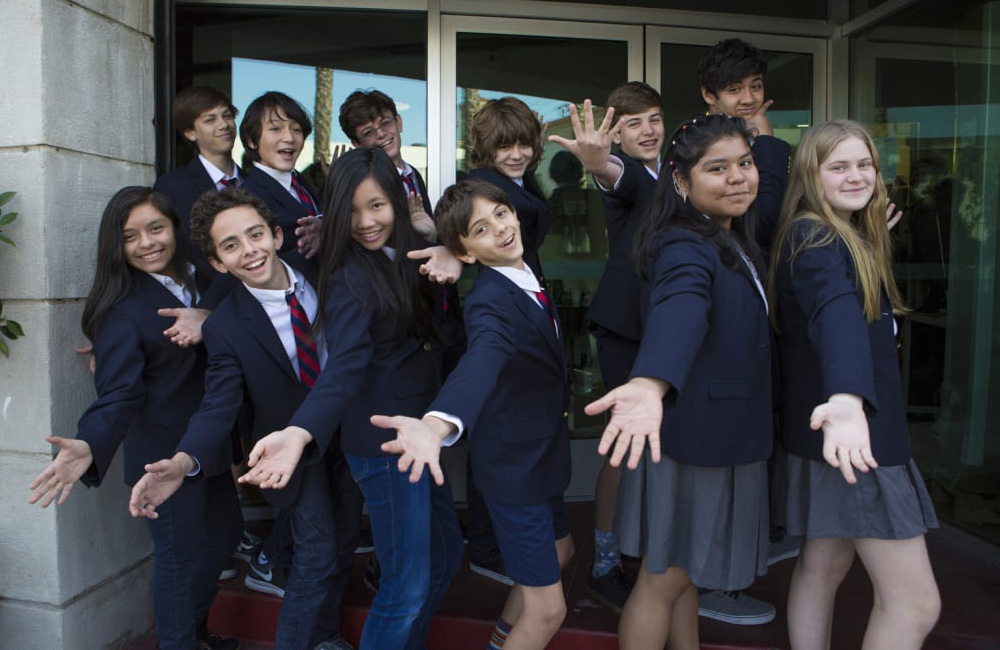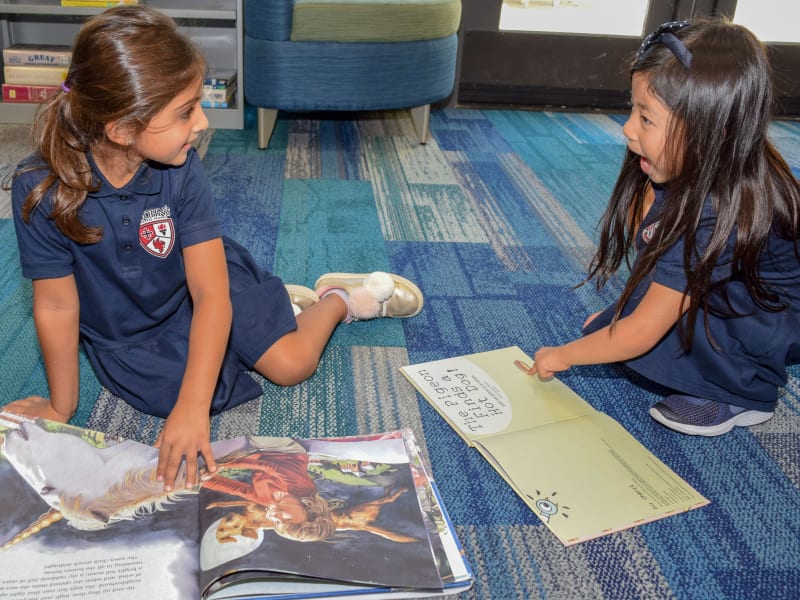
Students at Campbell Hall in North Hollywood walk between classes. Courtesy photo.
[The Episcopal News] For Chris Dennis, incorporating diversity, equity and inclusion (DEI) into Campbell Hall student experiences can be as simple a conversation as, “Who are the adults in your life every day? What do you know them as? What do you call them?
“Some will say, I have a Black mom and a white dad. I’m biracial,” said Dennis, the North Hollywood school’s associate head of community engagement. “You can open up the conversation and ask if anyone knows what biracial or multiracial means and can you understand that some students may have people in their family that you don’t have?”
Similarly, St. Margaret of Scotland School in San Juan Capistrano uses a “windows and mirrors” approach to equip students for becoming beloved community in an increasingly pluralistic society, according to Victor Cota, director of equity and inclusion.
“We want our students to be exposed to windows into other cultures, backgrounds and experiences, and that all students would see themselves mirrored or represented culturally, socially, racially, ethnically, and honored in their academic experiences,” said Cota, who also teaches a Wealth, Poverty and Ethics course at the 1,250-student preschool-through-12th-grade institution.
“My kids go to school here,” Cota added. “It’s the idea that Noah and Gabby are exposed to authors from different faith backgrounds … to other gender identities and that they get mirrors to see themselves represented, as Latinx, Latinos, and to experience strong male and female characters. As kids get older and are making their way, the idea is that if they’ve had many experiences in an academic setting, they’re prepared to wrestle with deeper and more real-world sorts of things that are not homogeneous, not just one way.”
He recalled a current events assignment, which prompted junior and senior high school students to grapple with the complexities of the Israeli-Palestinian conflict. “There are many different ways to view the situation, and when they are ready to arrive at a confident take, they can form their own understandings. It is not simple.”

Bishop Diane Jardine Bruce and Archbishop Rowan Williams get a tour of the St. Margaret’s School campus led by, from second left, sophomore Emelie Miller, junior Seychelle Balog, and senior Thomson Liu during a visit in 2019. Photo: Janet Kawamoto
From North Hollywood to Rancho Santa Margarita, Southland Episcopal school staff say that incorporating DEI into curriculum and experience – in spite of current controversies about their efficacy – really means teaching core Episcopal values, rooted in the baptismal promises to honor and respect the dignity of every human being.
Diocesan Bishop John Harvey Taylor agrees. “For our schools, these programs are the essence of Episcopal identity. Not all our school families are Christian by any means. Our chaplains teach and preach about the expansive inclusiveness of God, the pluralism of God, the image of God as a mosaic of infinite, miraculous difference.
“DEI is the educator’s way of saying the same thing – that our community’s not complete, that freedom and justice really aren’t for all, if every child isn’t seen and heard and respected and loved for who they are,” Taylor said.
“For me, a breakthrough was realizing that when I walked into a classroom and said, ‘Hello, boys and girls’ instead of ‘Hello, kids,’ I risked making a non-gender binary child feel invisible or unwelcome. Small adjustments in our language and mindsets can make an enormous difference.”

Students at the Episcopal School of Los Angeles strike a pose. Courtesy photo
‘Guides on the side’
The Rev. Julian Bull, headmaster of the 1,130-student Campbell Hall, said students increasingly face a world “where the issues of social injustice and climate change matter.” If we don’t help them develop some confidence and problem-solving skills and some knowledge base, then we haven’t really done our job. This is the timely application of gospel values.”
Current controversies about teaching critical race theory “have nothing to do with what we’re teaching,” Bull added. “We are talking about living together as a beloved community and looking honestly and courageously at what gets in the way of that.”
Ann Mellow, associate director of the National Association of Episcopal Schools (NAES), said that teaching Episcopal identity can get complicated in a demographically shifting and increasingly culturally divided nation, especially when only a fraction of students typically identify as Episcopalians.
“We believe in Episcopal schools that every person is a beloved child of God and they are equally beloved,” Mellow told The Episcopal News. “Therefore, we really have to examine our assumptions. It’s great to say we’re loving, caring, serving communities, but we really have to integrate that with people in our community and the reality is that … there has been hurt, there has been harm and it is an ever-evolving and unfolding journey towards being a truly equitable and just society.”
NAES, with some 700 member schools and preschools, recently concluded a three-year diversity initiative, committed to offer resources to a growing number of school diversity practitioners for “how the Episcopal mission and identity of our schools connects to the work around inclusion and belonging.”
For Patrick McHonett, head of St. John Chrysostom Episcopal School in Rancho Santa Margarita, where roughly a tenth of the 460-member student population is Episcopalian, incorporating DEI is both a necessity and a balanced, ongoing, joyful conversation.
“The world has changed in the last 16 months, and we have a responsibility to respond and adapt relative to that,” he told The News recently. “It’s something we’ve been wrestling with, while also recognizing it in our little bubble bedroom community.”
Often it involves being “guides on the side … when kids raise healthy, important, insightful questions or issues on everything from the election, or the January 6th riots at the Capitol, or to, you know, social and societal issues that they’re experiencing on a daily basis, so that our teachers are able to, in a really healthy way, facilitate that conversation.”

Students at St. John’s Episcopal School, Rancho Santa Margarita, enjoy picture books at the school library. Photo from school website
Admittedly, those questions can get complicated. “For example, what is our response to issues about poverty, about violence at the capital? What is our response when an eighth grader is having trouble with gender identity, rather than simply saying something is wrong, or being silent? We are suddenly having to re-establish a dialogue about identity that includes those DEI factors, that includes baptismal vows.”
He added: “You don’t lose being an Episcopal school the minute you step into the science lab, or into a math class. That’s an area of growth for us, this inclusive identity, big enough arms to wrap around everybody and not let anybody slip through the cracks is a key component of our Episcopal faith.”
Will Litton, communications director at the Episcopal School of Los Angeles, said the 6th- to 12th-grade institution has unveiled a new humanities curriculum in response to student questions about the culture.
“We have this long foundation of the Episcopal tradition that we can rely on,” Litton told The News. “We want to provide a curriculum to allow our students to explore and understand, in a really deep, rigorous way … the kind of root issues that so many of our students are interested in and are preoccupied with trying to understand, like what it means to be feminist, what Black Lives Matter is about, what whiteness is as an historical practice.”
McHonett said the St. John’s mission “states that we, as a school, are committed to the whole child through the rich and diverse viewpoints of the Episcopal tradition” and DEI involves simply meeting students where they already are.
It involves a self-assessment of institutional practices as well; “to also hold up a mirror and to be able to assess in what areas of our community, our school culture, our academic program, are we missing the mark?”
Such examinations “can range from the practical, with how we present our dress code, to looking at our literature and curriculum and making sure we have diverse voices and viewpoints, to our hiring practices or need-based financial aid processes and protocols. It really touches upon everything.”
Parent partnerships are key, said Campbell Hall’s Dennis, who began his role April 1, 2021.
“We need to know what parents are ready for and what makes them uncomfortable so we can have the adult conversations before we have them with students,” he said. “Transparency on the front end is important for when hot button issues pop up.”
In addition to identity and diversity, the school’s curriculum focuses students on justice issues and on taking action. “We want everyone to have positive social identities and to be able to have self-awareness and self-confidence in who they are,” he said. “We want to build strong identities.”
Nurturing “accurate language for our human differences and deep caring connections enables students to recognize unfairness and how it hurts others,” Dennis said. And then, “enabling students to recognize they can – individually or collectively – take action against discriminatory practices.
“So, if someone is being targeted for their identity, students will know how to stand up for them,” said Dennis. “There is great joy in equity work. When you get to learn something about someone and see the ways we all have similar connections, you can celebrate those connections.”
St. John’s McHonett agreed: “The dialogue is ongoing, to be built upon shared foundational beliefs. It will never be done.
